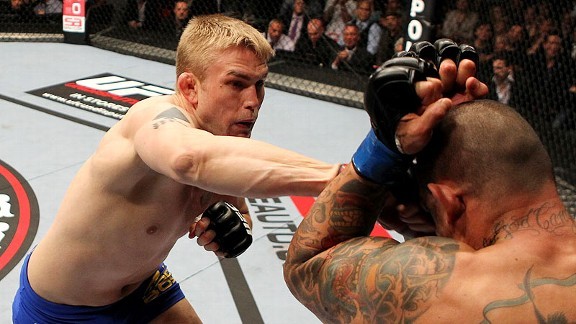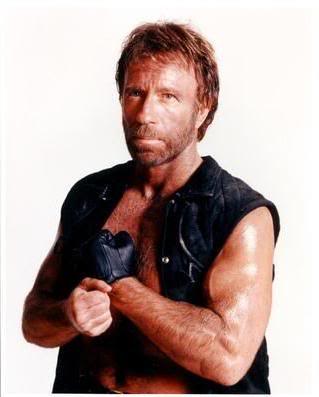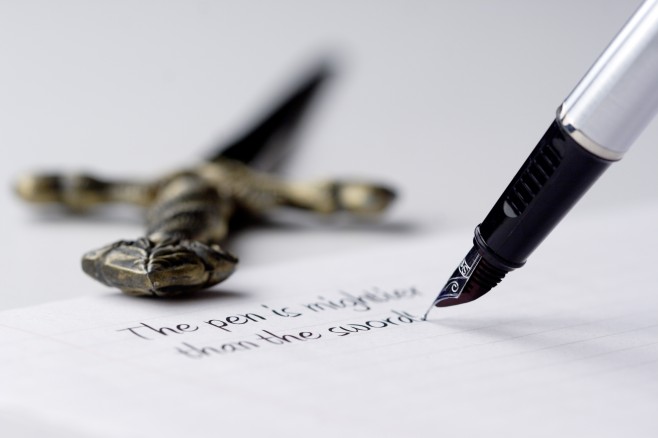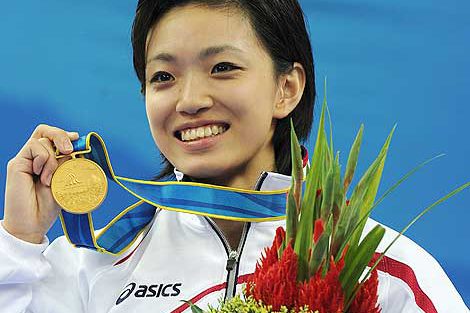You are training MMA.
Yup!
If you do Karate, you’re an original Mixed Martial Artist.
You see, Karate was originally a highly functional mix of different fighting methods imported to the tiny island of Okinawa, from several geographically and culturally strategic sources over the span of several hundreds of years. It is the direct result of historical trial and error.
Obviously, Karate has changed a lot ever since.
But the fact remains…
Original Karate was a true MIX of different fighting methods.

Today, however, many Karate practitioners either don’t know, don’t show, or don’t care about this fact.
They seem to think it’s all about “my style”, “my dojo” or “my sensei”.
But from the beginning, Karate was NOTHING like that.
It was about exploring, being open minded, constantly searching for improvement and discovering new stuff to develop your mind, body and technique.
So let’s go “back”.
By interviewing one of the greatest MMA fighters of our generation – Alexander ‘The Mauler’ Gustafsson.

Are you ready?
This is probably the closest you’ll come to talking to a UFC fighter.
Granted, he doesn’t know more about modern Karate than you or me – but he does know how to fight at the top of one of the most dangerous martial sports on the planet.
By efficiently mixing skills from several martial arts.
Check it out:

————
Location: Allstars MMA Gym, Stockholm, Sweden.
Time: Early as hell. Why can’t MMA fighters sleep in?
Participants: Me, my little brother (pro MMA fighter) and Alexander ‘The Mauler’ Gustafsson – #2 ranked light heavyweight contender in the world (UFC ).
Carrot cake: None. Just sweaty guys. (Ladies, take note.)
J (Jesse): All right, let’s get it on! First of all, a huge thanks to you Alex for taking time from your intense fight camp for this interview. I really appreciate it.
AG (Alexander Gustafsson): “No problem Jesse! I just finished training anyway.”
J: Perfect. So let’s start with my first question: Lately, some of my Karate friends have started doing MMA, sensing bigger opportunities for making a living by following their passion (fighting). With more and more martial artists making a transition to MMA, what are the most important things a light-contact/point-sparring Karate-ka should keep in mind if he/she want to try full-contact fighting one day (like MMA), in your opinion?
AG: “Well, the first thing is pretty obvious: You should have a solid understanding of what full contact really means. Because, count on this: It will hurt. But at the same time, I don’t think this has anything to do with what martial arts background you have. You will be put in the beginners group like everybody else, to learn the basics of full-contact fighting. But, again, bottom line: You should keep in mind that MMA hurts. So be prepared for that.”
J: Right. And based on my own limited experience from fighting in MMA (specifically: Shootfighting), I can vouch for that. But you actually started off with boxing, a more traditional Western martial art, before moving on to MMA. Have you ever encountered any prejudices from traditional martial artists about MMA during your journey?
AG: “Well, although I don’t think this misconception really exists in today’s martial arts world, there used to be a time when everybody thought that only gangsters did MMA. And because it was such an underground sport, people basically had this idea that we drank beer and punched each other senseless in somebody’s basement.”
J: Wait, you mean you *dont*?!
AG: “Hah! Right, but it’s not like that anymore. Among martial artists, I think MMA is pretty much accepted as a legit sport everywhere. People understand what they see. And that’s crucial, because misunderstandings occur when people don’t have a good understanding of what they’re seeing. I think probably the biggest misconception arises when the general public flips through their TV channels and catch a glimpse of two sweaty men killing each other inside a cage, without understanding the context. But I often find the critique given from “regular” sports towards MMA unfair, especially when you consider the fact that we have a more advanced repertoire of techniques than many sports out there. But again, I don’t think there exist a general negativity against MMA in the global martial artists community anymore. We are past that.”

J: And rightfully so. Now, let’s move on to more practical aspects of MMA: I once heard a Karate enthusiast say “It’s easy to knock somebody out if you really want to”. After almost spitting out my drink, I started to wonder if maybe he was right? Since you are pretty slick at the K.O. game, what are your best advice when it comes to knocking dudes out? Have you ever been knocked out yourself?
AG: “To be perfectly honest, I’ve never really been knocked out cold. Obviously I’ve been dropped a couple of times, and even seen stars and planets on occasions, but never really knocked out. Still, I get dropped almost daily [laughs]! The most important advice for not getting knocked out? Chin down, hands up. It’s really just that. Stay tight in your combinations and attacks. Try to aim for the chin.”
J: And again, we are reminded why I don’t practice MMA: Getting dropped daily sounds pretty annoying. But, another important skill you didn’t mention is footwork. Right? Needless to say, you are pretty famous for your smooth footwork. What are your thoughts on that? What are some common mistakes you see people doing in their footwork?
AG: “The most common mistake I see people doing in their footwork has to be when they execute a beautiful combination and then just stand completely still. You should always move after a combo. Strike, then move. Strike, then move. Try to move away in angles. And that’s the first thing. The second thing I see is people moving on their heels. That’s a big mistake because it makes it hard for you to move around and counter. Stay on your toes and always move in angles.”
J: What’s the best exercise for training footwork?
AG: “Shadow boxing, bag work, focus pads, sparring… Everything. Anything. You just need to think about it. You can train it all the time, as long as you keep thinking about it.”
J: Luckily, many Karate-ka are already pretty good at footwork. Now, if you had to fight a famous Karate/MMA fighter, like, say, Lyoto ‘The Dragon’ Machida yourself, what would your main strategy be? Hypothetically speaking, what would your “anti-Karate” strategy be?
AG: “Wow… I would probably try to cut him off. Cut his angles of movement. Meaning, I don’t want to give him the space he needs for his evasive Karate body movements [taisabaki] and footwork. I would try to put pressure on him, have him back up, feint a lot and try to work on some takedowns to neutralize his main Karate weapons. Keep it varied.”

J: Got it. Speaking of variation: An important, but hard, part about MMA is figuring out how to prioritize the many elements of the game. The same goes for Karate. We have many areas (kata, bunkai, kihon, kumite, self-defense, kobudo, conditioning, competing etc.) that need training – how do you choose which ones to train?
AG: “Well, you really need to put focus on everything to become the best. But of course, prioritize the elements where you are lacking to begin with. Above all, listen to your instructor. That’s the alpha and omega of it all. Listen to your instructor and do what he says. You shouldn’t need to think about what to constantly improve or train. Put those thoughts aside, follow your schedule and do what your instructor wants you to do. Your job is to get to the gym, do the job, and after practice you can do whatever you want. That’s really it. Save your mental energy for the actual training, listen to your instructor and give it your all. Trust your coach.”
J: Sensei knows best! Now imagine this: One day, while walking to the gym, you are suddenly confronted by a wizard who blasts you with a magic spell. The spell makes you incapable of using more than three techniques for the rest of your MMA career! What would those three techniques be? In other words, what three techniques could win the majority of your fights (see ‘The 80/20 Principle’)?
AG: “[Laughs] …on the ground, or standing up?”
J: Your choice. The “top 3” techniques that will win most of the fights for you.
AG: “Okay, so my first pick is the jab. The jab never leaves.”
J: Okay. Second?
AG: “Left/right combo.”
J: Bam! And third?
AG: “The third will be the single-leg takedown. Those three techniques will do the trick most of the time!”

J: Awesome! Those three techniques actually reveal a lot about your fighting style. But, as a professional fighter, you’ll naturally need more than just three moves in your arsenal. What exactly does a regular “day in the office” look like for a UFC fighter like you anyway?
AG: “Most days I wake up at seven o’clock, have a cup of coffee and walk my dogs. I come to the gym at nine o’clock. The morning session generally consists of pretty hard training, including conditioning, sparring or Thai pads. Or simply a brutal strength training session. Later, in the evening, the focus is on a single aspect; like grappling, jiu-jitsu or boxing. The evening sessions are always more technical.”
J: And most importantly, what do you eat for breakfast?
AG: “Porridge.”
J: Porridge?
AG: “Porridge. With blueberries and honey [laughs]!”
J: You just made me hungry! Being a MMA fighter seems fun. But I bet you have some sucky days too, no? We all have. So what is the hardest part about being a fighter? You know, the part that makes you go: “I wish I worked at McDonald’s!”?
AG: “The most dreadful part about being a MMA fighter is definitely fight camp [8-10 weeks of intense training leading up to a specific fight]. There is nothing worse. It’s so monotonous, so hard and so nasty that you just want to puke every day.”
J: What about cutting weight?
AG: “I can handle that well. The eight-week grind before a fight is much worse. Especially for your psyche, since you have to perform at your best every day. It’s not enough to “just” show up anymore. You got to work your ass off too. It’s not about having fun. It’s dead serious. It’s one of those things that either breaks you or makes you stronger.”
J: Word. It’s the same for me when I go to Japan for intense training. And I’m not alone – many Karate enthusiasts often travel to Japan in order to learn from masters of the art. In similar vein, you regularly travel to USA to learn from “master coaches” of MMA too. Why? What ancient teachings do they possess that you can’t train at home?
AG: “Well, they’ve got a whole lot more knowledge. About everything. And not only that, but their philosophy is different. Also, they have a lot more hard sparring, with better opponents, since more people practice it. Everything is on a higher level over there.”

J: Just like Karate in Japan. Does the inspirational/motivational aspect play a part?
AG: “Absolutely. The inspiration you get from training with some of the best in the world is incredibly powerful for your self-esteem, especially if you happen to beat them. Another important aspect is the change of scenery, for my mental preparation. Getting away from my dogs, girlfriend and snuff changes my focus completely!”
J: I can imagine. But let’s talk about fear now. See, a lot of people get scared when they need to fight, even in the safe dojo environment. Do you ever feel afraid in your fights? How do you handle it? I mean, the guy standing in front of you has trained several months just to beat you up – but still, you always look so relaxed in your fights!
AG: “You’re kidding, right? I’m always afraid. And nervous. The trick is: Don’t be afraid of your fear. You should never be afraid of performance anxiety or fear, because those feelings are natural parts of a fight. In the best of worlds, that fear actually triggers your emotions to fight even better. Fighters who are never afraid or nervous don’t get far, because they lack that extra mental edge. Their game is not on top. Fear gives you that.”
J: True. Fear is a double-edged sword in the battle for peak performance. But, until you learn to cooperate with your fear, it can be helpful to control it some way. Do you have any mental training methods in MMA? In Karate we have mokuso.
AG: “My best advice for mental training is simply to create good habits, in order to build a sense of security and calm around you. Also, you could try to distance yourself emotionally from the whole situation. In my case, I just look at it objectively: We are two guys going inside a cage to work. That’s it. Try to de-escalate the pressure. Take a couple of deep breaths. Don’t hype things up. And stay positive, even if you’re fighting for your life. Positive thinking is a habit, like everything else. You get better at it with time.”
J: So basically, you want to be comfortable enough to trust your skills, but afraid enough to take it seriously?
AG: “You want to be like a ticking bomb. As calm as possible before the fight, to save energy… But ready to explode the second you step into the cage.”
J: I love that imagery. But, what about faith? I’ve read that you believe in God. Does that add some kind of “mental strength”? An extra feeling of holy support, so to speak?
AG: “My faith makes me feel secure, in every situation. It doesn’t really make me better as an athlete, but my faith has always been there and will always be there. It’s not something I consider “mental training” or anything. But when you fight you are putting yourself to the test for sure, and a strong faith can act as a cushion if you should break mentally.”

J: I see. It’s time for us to round this interview off, but first, let’s look back: What is your most memorable experience so far in your MMA career? Share your most exciting moment!
AG: “That would be my first fight in Sweden, against Thiago ‘Pitbull’ Silva at UFC on Fuel TV in 2012, and my debut fight in 2009 at UFC 105 against Jared ‘The Messenger’ Hamman in the UK.”
J: Not your fight against Mauricio ‘Shogun’ Rua?
AG: “Not really. I mean, sure, Shogun is a legend in the sport, and it was a “Wow!”-moment to beat him, but the experience of fighting Thiago Silva at home in Sweden was even more incredible. I almost sh*t my pants from nervosity before that fight, which made the victory extra special. I was so frickin’ nervous, man. And Thiago truly looks life-threatening too. He looks crazy. He’s a killer. So that was a real test.”
J: What a relief to win that fight! Now let’s look at the future. Karate is a martial art which, by its very nature, allows its practitioner to practice for a lifetime. On the other hand, MMA is a pretty intense sport that takes a lot of toll on your body. What are your plans for the future? You know, when you’re not able to compete anymore?
AG: “Well, first of all, I’ll be saving some of this fight money for investments, to secure the future of me and my family. But then, you know, I’m one of those guys who could never just retire, since I have this inner drive that constantly pushes me forward. I’ll probably transfer my energy to entrepreneurialism, or something similar, instead.”
J: No coaching?
AG: “No. Either I do MMA, or I don’t do MMA. If I quit MMA, I quit MMA. Coaching isn’t really my thing.”
J: Cool. I’m kinda like that too. Go hard or go home. So, last question: This is probably the most challenging question you’ve ever received, and I truly want you to think hard on this one.
AG: “Okay.”
J: You ready?
AG: “I’m ready!”

J: If you were trapped in a death match between Bruce Lee, Chuck Norris, Steven Seagal and Mr. Miyagi – who would win?
AG: “That would be me.”
J: Wrong! Chuck Norris would! But nice try anyway. Jokes aside though, that was actually my last qustion of this interview, Alex. You have given us a lot of great advice today, applicable to both MMA, Karate and life in general. My readers are all grateful for that. Best of luck with your continued training, porridge eating and fighting – and we’re looking forward to seeing your become the next light heavyweight world title holder of the UFC!
AG: “Thanks Jesse, take care. And good luck with your own training!”



12 Comments